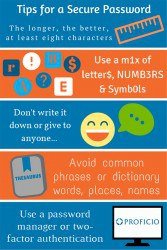May 5th, 2016 is World Password Day – a day created to encourage safe password practices. The best defense against external threats is staying informed and diligent with your security practices, especially when it comes to email security.
Here are some tips to help stay safe from email threats:
- Never share your password. If someone is requesting this information via email, they are phishing for access to your account. Understand that reputable businesses would never ask for personal information via email.
- Change your password often and create strong passwords – use a combination of letters (capital and lower case), numbers, and special characters that is at least eight characters long
- DO NOT open email attachments unless you know the sender, are expecting attachments from them, or can verify that the approved sender sent the attachment. If you receive an attachment you cannot verify, DELETE IT – it’s better to have someone have to resend the attachment.
- DO NOT reply to spam messages or emails that seems suspicious.
- Learn how to recognize phishing and spear phishing attacks. Some examples of frequently used techniques to steal your credentials are:
- Messages that contain threats to stop services or shut down your accounts
- Emails that request personal information (i.e. account numbers, PHI, credit card information, passwords, etc.)
- Emails that use words such as “Urgent” or Immediate Response Requested”. These words usually raise a sense of alarm, and make feel like a reply is warranted
- Forged email addresses. These are sometimes hard to notice as some email programs leave out email addresses in the body. If you are suspicious of messages in the body you can check the senders true Identity in the email headers
- Poor writing or grammar errors
- Be aware of links in email. Before clicking anything, verify the links are valid by hovering over link to see if the URL looks legitimate. You can also check links by typing them into virustotal.com or using Google search engine
- Be aware of where you are posting your personal information. Spammers tend to “troll” social media sites for information they can use to make their email seem legitimate or guess your password.
Just following these few tips will help to keep your email more secure and ensure your password protected information is safe.
